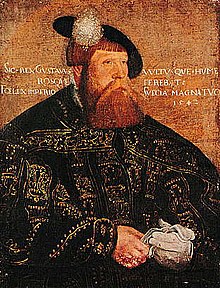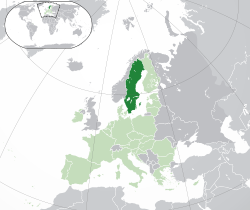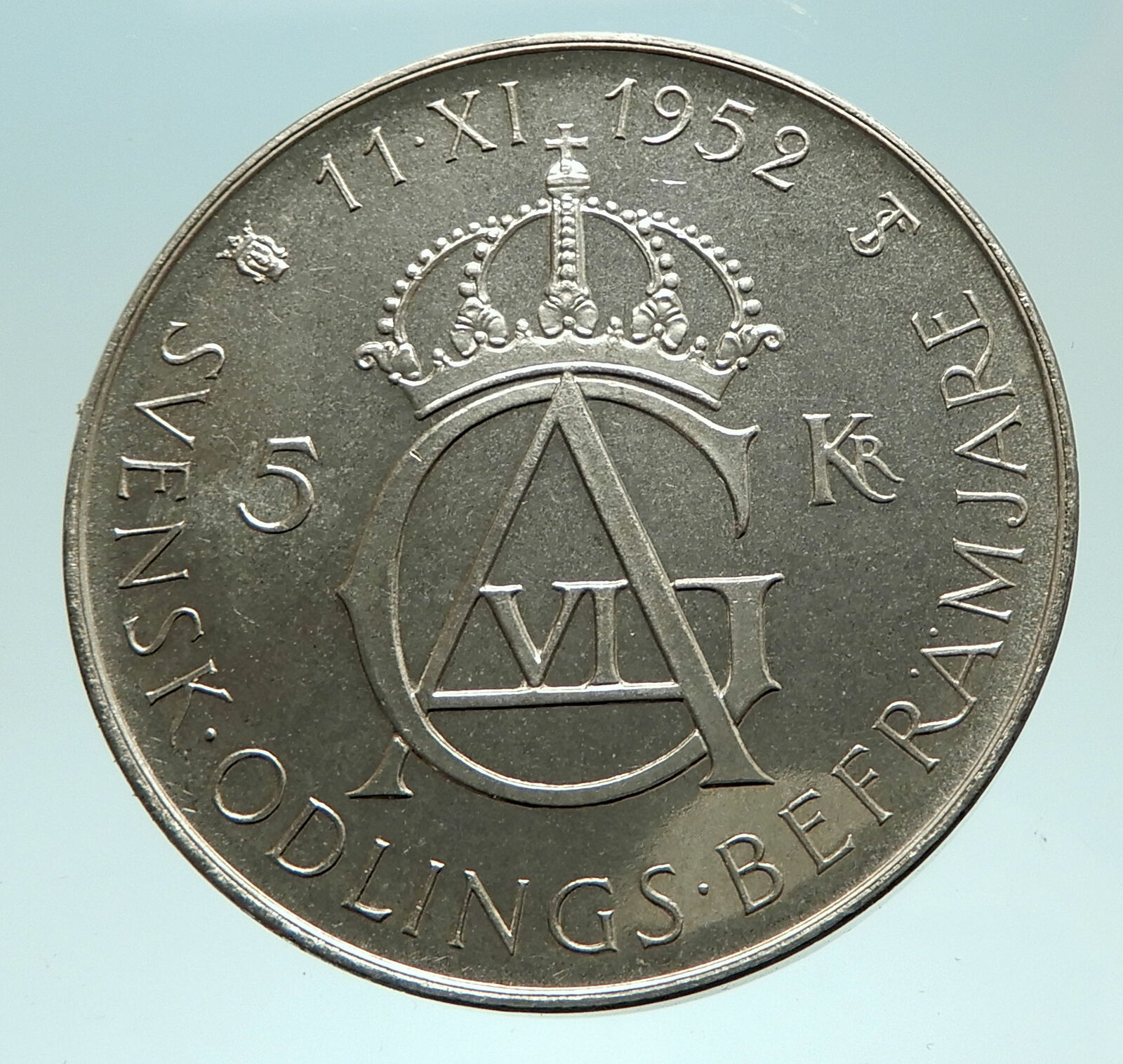|
Sweden – King Gustav I, (Ruled 1523-1560) –
400th Anniversary of Gustaf Vasa’s Liberation War
1921 Silver 2 Kronor 31mm (14.99 grams) 0.800 Silver (0.3858 oz. ASW)
Reference: KM# 799
400 ÅRSMINNE AV GUSTAF VASAS BEFRIELSEVERK, Portrait of King Gustaf Vasa facing right within ornate laurel circle. Below his coat of arms.
GUSTAF V SVERIGES KONUNG 2 Kr W, Crowned Coat of arms of Sweden partially in ornate laurel wreath divides date. Value below at both sides of Arms with Stockholm mintmark at left and initial of Riksbank Governor’ surname at right.
You are bidding on the exact item pictured, provided with a Certificate of Authenticity and Lifetime Guarantee of Authenticity.
Gustav I, born Gustav Eriksson of the Vasa noble family and later known as Gustav Vasa (12 May 1496 – 29 September 1560), was King of Sweden from 1523 until his death in 1560, previously self-recognised Protector of the Realm (Riksföreståndare) from 1521, during the ongoing Swedish War of Liberation against King Christian II of Denmark, Norway and Sweden. Initially of low standing, Gustav rose to lead the rebel movement following the Stockholm Bloodbath, in which his father perished. Gustav’s election as King on 6 June 1523 and his triumphant entry into Stockholm eleven days later marked Sweden’s final secession from the Kalmar Union.
 As King, Gustav proved an enigmatic administrator with a ruthless streak not inferior to his predecessor’s, brutally suppressing subsequent uprisings (three in Dalarna – which had once been the first region to support his claim to the throne – one in Västergötland, and one in Småland). He worked to raise taxes and bring about a Swedish Reformation, replacing the prerogatives of local landowners, noblemen and clergy with centrally appointed governors and bishops. His 37-year rule, which was the longest of a mature Swedish king to that date (subsequently passed by Gustav V and Carl XVI Gustav) saw a complete break with not only the Danish supremacy but also the Roman Catholic Church, whose assets were nationalised, with the Lutheran Church of Sweden established under his personal control. He became the first truly autocratic native Swedish sovereign and was a skilled bureaucrat and propagandist, with tales of his largely fictitious adventures during the liberation struggle still widespread to date. In 1544, he abolished Medieval Sweden’s elective monarchy and replaced it with a hereditary monarchy under the House of Vasa and its successors, including the current House of Bernadotte. Due to a vibrant dynastic succession, three of his sons, Erik XIV, Johan III and Karl IX, all held the kingship at different points. As King, Gustav proved an enigmatic administrator with a ruthless streak not inferior to his predecessor’s, brutally suppressing subsequent uprisings (three in Dalarna – which had once been the first region to support his claim to the throne – one in Västergötland, and one in Småland). He worked to raise taxes and bring about a Swedish Reformation, replacing the prerogatives of local landowners, noblemen and clergy with centrally appointed governors and bishops. His 37-year rule, which was the longest of a mature Swedish king to that date (subsequently passed by Gustav V and Carl XVI Gustav) saw a complete break with not only the Danish supremacy but also the Roman Catholic Church, whose assets were nationalised, with the Lutheran Church of Sweden established under his personal control. He became the first truly autocratic native Swedish sovereign and was a skilled bureaucrat and propagandist, with tales of his largely fictitious adventures during the liberation struggle still widespread to date. In 1544, he abolished Medieval Sweden’s elective monarchy and replaced it with a hereditary monarchy under the House of Vasa and its successors, including the current House of Bernadotte. Due to a vibrant dynastic succession, three of his sons, Erik XIV, Johan III and Karl IX, all held the kingship at different points.
Gustav I has subsequently been labelled the founder of modern Sweden, and the “father of the nation”. Gustav liked to compare himself to Moses, whom he believed to have also liberated his people and established a sovereign state. As a person, Gustav was known for ruthless methods and a bad temper, but also a fondness for music and had a certain sly wit and ability to outmaneuver and annihilate his opponents. He founded one of the now oldest orchestras of the world, the Kungliga Hovkapellet (Royal Court Orchestra). Royal housekeeping accounts from 1526 mention twelve musicians including wind players and a timpanist but no string players. Today the Kungliga Hovkapellet is the orchestra of the Royal Swedish Opera.
 Sweden, officially the Kingdom of Sweden, is a Scandinavian country in Northern Europe. It borders Norway and Finland, and is connected to Denmark by a bridge-tunnel across the Öresund. At 450,295 square kilometres (173,860 sq mi), Sweden is the third-largest country in the European Union by area, with a total population of over 9.8 million. Sweden consequently has a low population density of 21 inhabitants per square kilometre (54/sq mi), with the highest concentration in the southern half of the country. Approximately 85% of the population lives in urban areas. Southern Sweden is predominantly agricultural, while the north is heavily forested. Sweden is part of the geographical area of Fennoscandia. Sweden, officially the Kingdom of Sweden, is a Scandinavian country in Northern Europe. It borders Norway and Finland, and is connected to Denmark by a bridge-tunnel across the Öresund. At 450,295 square kilometres (173,860 sq mi), Sweden is the third-largest country in the European Union by area, with a total population of over 9.8 million. Sweden consequently has a low population density of 21 inhabitants per square kilometre (54/sq mi), with the highest concentration in the southern half of the country. Approximately 85% of the population lives in urban areas. Southern Sweden is predominantly agricultural, while the north is heavily forested. Sweden is part of the geographical area of Fennoscandia.

 Germanic peoples have inhabited Sweden since prehistoric times, emerging into history as the Geats/Götar and Swedes/Svear and constituting the sea peoples known as the Norsemen. Sweden emerged as an independent and unified country during the Middle Ages. In the 17th century, it expanded its territories to form the Swedish Empire, which became one of the great powers of Europe until the early 18th century. Swedish territories outside the Scandinavian Peninsula were gradually lost during the 18th and 19th centuries, beginning with the annexation of present-day Finland by Russia in 1809. The last war in which Sweden was directly involved was in 1814, when Norway was militarily forced into personal union. Germanic peoples have inhabited Sweden since prehistoric times, emerging into history as the Geats/Götar and Swedes/Svear and constituting the sea peoples known as the Norsemen. Sweden emerged as an independent and unified country during the Middle Ages. In the 17th century, it expanded its territories to form the Swedish Empire, which became one of the great powers of Europe until the early 18th century. Swedish territories outside the Scandinavian Peninsula were gradually lost during the 18th and 19th centuries, beginning with the annexation of present-day Finland by Russia in 1809. The last war in which Sweden was directly involved was in 1814, when Norway was militarily forced into personal union.
Since then, Sweden has been at peace, maintaining an official policy of neutrality in foreign affairs. The union with Norway was peacefully dissolved in 1905, leading to Sweden’s current borders. Though it was formally neutral through both world wars, Sweden engaged in humanitarian efforts, such as taking in refugees from German-occupied Europe. After the end of the Cold War, Sweden joined the European Union on 1 January 1995, but declined NATO membership.
Today, Sweden is a constitutional monarchy and a parliamentary democracy, with the Monarch as the head of state. The capital city is Stockholm, which is also the most populous city in the country. Legislative power is vested in the 349-member unicameral Riksdag. Executive power is exercised by the Government, chaired by the Prime Minister. Sweden is a unitary state, currently divided into 21 counties and 290 municipalities.
Sweden maintains a Nordic social welfare system that provides universal health care and tertiary education for its citizens. It has the world’s eighth-highest per capita income and ranks highly in numerous metrics of national performance, including quality of life, health, education, protection of civil liberties, economic competitiveness, equality, prosperity and human development. Sweden has been a member of the European Union since 1 January 1995, but declined Eurozone membership following a referendum. It is also a member of the United Nations, the Nordic Council, Council of Europe, the World Trade Organization and the Organisation for Economic Co-operation and Development (OECD).
|





 As King, Gustav proved an enigmatic administrator with a ruthless streak not inferior to his predecessor’s, brutally suppressing subsequent uprisings (three in Dalarna – which had once been the first region to support his claim to the throne – one in Västergötland, and one in Småland). He worked to raise taxes and bring about a Swedish Reformation, replacing the prerogatives of local landowners, noblemen and clergy with centrally appointed governors and bishops. His 37-year rule, which was the longest of a mature Swedish king to that date (subsequently passed by Gustav V and Carl XVI Gustav) saw a complete break with not only the Danish supremacy but also the Roman Catholic Church, whose assets were nationalised, with the Lutheran Church of Sweden established under his personal control. He became the first truly autocratic native Swedish sovereign and was a skilled bureaucrat and propagandist, with tales of his largely fictitious adventures during the liberation struggle still widespread to date. In 1544, he abolished Medieval Sweden’s elective monarchy and replaced it with a hereditary monarchy under the House of Vasa and its successors, including the current House of Bernadotte. Due to a vibrant dynastic succession, three of his sons, Erik XIV, Johan III and Karl IX, all held the kingship at different points.
As King, Gustav proved an enigmatic administrator with a ruthless streak not inferior to his predecessor’s, brutally suppressing subsequent uprisings (three in Dalarna – which had once been the first region to support his claim to the throne – one in Västergötland, and one in Småland). He worked to raise taxes and bring about a Swedish Reformation, replacing the prerogatives of local landowners, noblemen and clergy with centrally appointed governors and bishops. His 37-year rule, which was the longest of a mature Swedish king to that date (subsequently passed by Gustav V and Carl XVI Gustav) saw a complete break with not only the Danish supremacy but also the Roman Catholic Church, whose assets were nationalised, with the Lutheran Church of Sweden established under his personal control. He became the first truly autocratic native Swedish sovereign and was a skilled bureaucrat and propagandist, with tales of his largely fictitious adventures during the liberation struggle still widespread to date. In 1544, he abolished Medieval Sweden’s elective monarchy and replaced it with a hereditary monarchy under the House of Vasa and its successors, including the current House of Bernadotte. Due to a vibrant dynastic succession, three of his sons, Erik XIV, Johan III and Karl IX, all held the kingship at different points.  Sweden, officially the Kingdom of Sweden, is a Scandinavian country in Northern Europe. It borders Norway and Finland, and is connected to Denmark by a bridge-tunnel across the Öresund. At 450,295 square kilometres (173,860 sq mi), Sweden is the third-largest country in the European Union by area, with a total population of over 9.8 million. Sweden consequently has a low population density of 21 inhabitants per square kilometre (54/sq mi), with the highest concentration in the southern half of the country. Approximately 85% of the population lives in urban areas. Southern Sweden is predominantly agricultural, while the north is heavily forested. Sweden is part of the geographical area of Fennoscandia.
Sweden, officially the Kingdom of Sweden, is a Scandinavian country in Northern Europe. It borders Norway and Finland, and is connected to Denmark by a bridge-tunnel across the Öresund. At 450,295 square kilometres (173,860 sq mi), Sweden is the third-largest country in the European Union by area, with a total population of over 9.8 million. Sweden consequently has a low population density of 21 inhabitants per square kilometre (54/sq mi), with the highest concentration in the southern half of the country. Approximately 85% of the population lives in urban areas. Southern Sweden is predominantly agricultural, while the north is heavily forested. Sweden is part of the geographical area of Fennoscandia.
 Germanic peoples have inhabited Sweden since prehistoric times, emerging into history as the Geats/Götar and Swedes/Svear and constituting the sea peoples known as the Norsemen. Sweden emerged as an independent and unified country during the Middle Ages. In the 17th century, it expanded its territories to form the Swedish Empire, which became one of the great powers of Europe until the early 18th century. Swedish territories outside the Scandinavian Peninsula were gradually lost during the 18th and 19th centuries, beginning with the annexation of present-day Finland by Russia in 1809. The last war in which Sweden was directly involved was in 1814, when Norway was militarily forced into personal union.
Germanic peoples have inhabited Sweden since prehistoric times, emerging into history as the Geats/Götar and Swedes/Svear and constituting the sea peoples known as the Norsemen. Sweden emerged as an independent and unified country during the Middle Ages. In the 17th century, it expanded its territories to form the Swedish Empire, which became one of the great powers of Europe until the early 18th century. Swedish territories outside the Scandinavian Peninsula were gradually lost during the 18th and 19th centuries, beginning with the annexation of present-day Finland by Russia in 1809. The last war in which Sweden was directly involved was in 1814, when Norway was militarily forced into personal union.




